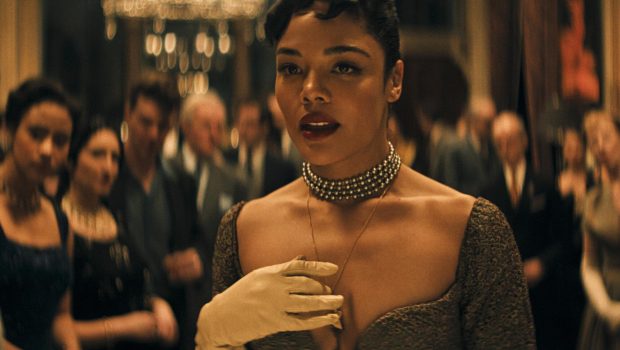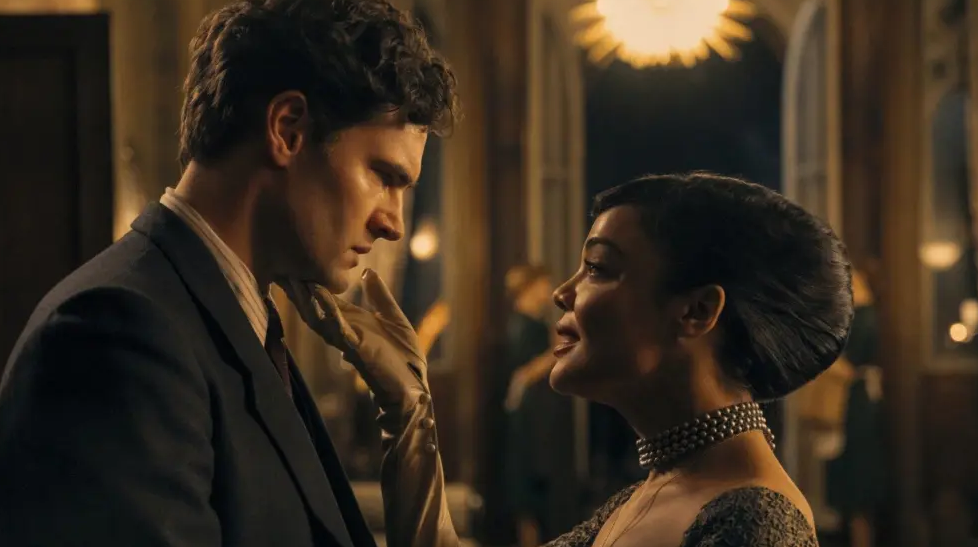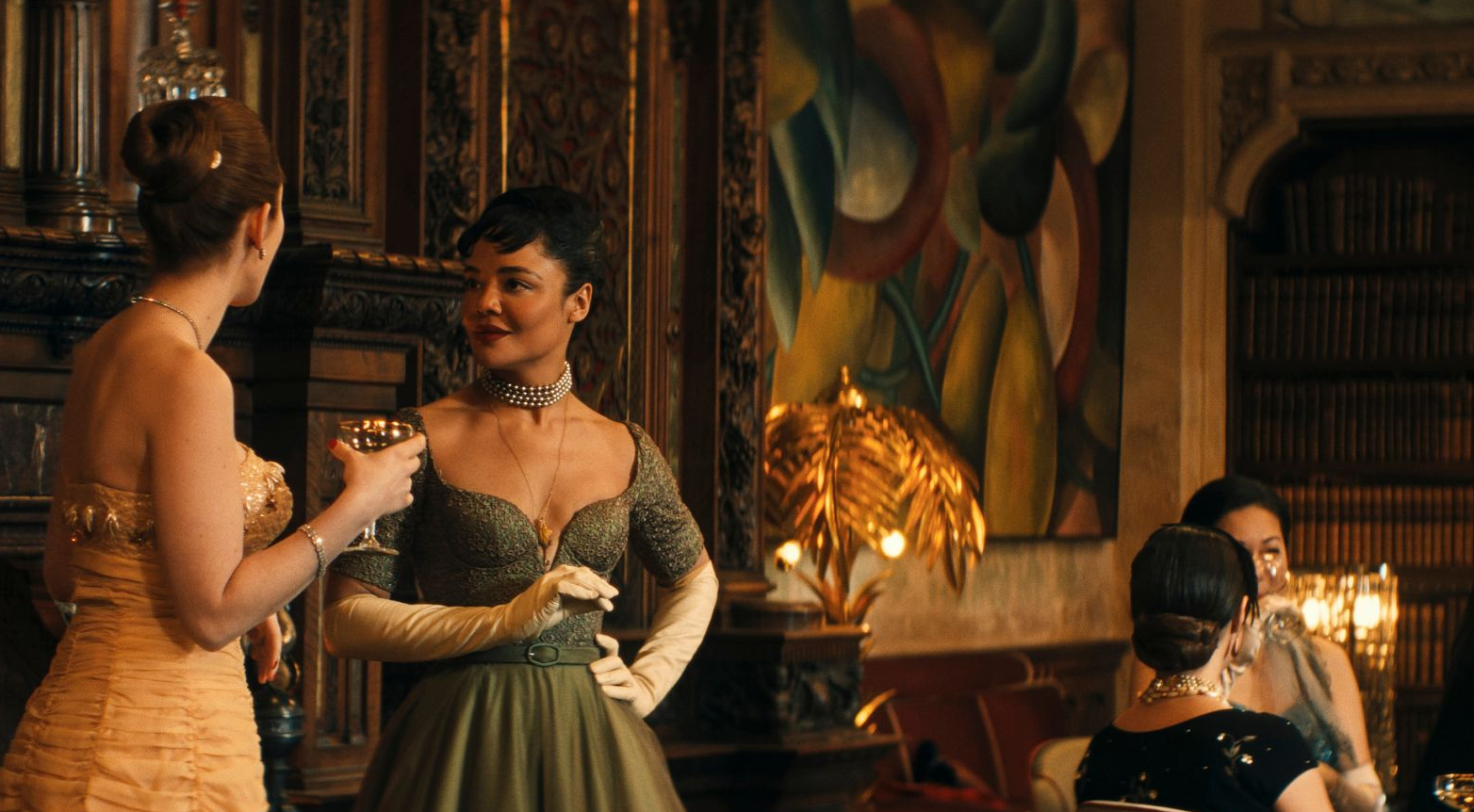Hedda – Film Review
Reviewed by Harris Dang on the 23rd of October 2025
Amazon Prime presents a film by Nia DaCosta
Screenplay by Nia DaCosta based on Hedda Gabler by Henrik Ibsen
Produced by Nia DaCosta, Gabrielle Nadig, Tessa Thompson, Dede Gardner, and Jeremy Kleiner
Starring Tessa Thompson, Imogen Poots, Tom Bateman, Nicholas Pinnock, Nina Hoss, and Mirren Mack
Cinematography Sean Bobbitt
Edited by Jacob Secher Schulsinger
Music by Hildur Guðnadóttir
Rating: TBA
Running Time: 107 minutes
Release Date: available to stream on Amazon Prime on 29 October 2025
Set in 20th century England, Hedda tells the story of its titular heroine (Tessa Thompson). She is stuck in an impasse as she impulsively plays with her father’s pistols and without consequences toys with people’s emotions. She is the supposed bastard child of General Gabler and is married to her academic husband, George (an amusingly introverted stiff Tom Bateman). He does everything to control her under the guise of pleasing her. While she was from a wealthy family, their persistence for constant wealth puts Hedda’s marriage with George in doubt.
As if things could not deteriorate further, they return from a honeymoon to a huge mansion they cannot afford. Their livelihood now hinges on George filling a job position as a university teacher. Hedda plans a spectacular party by inviting her filthy rich friends, including Judge Roland Brack (played with understated lecherousness by Nicholas Pinnock) and George’s boss, Professor Greenwood (Finbar Lynch), and his unfathomably young wife, Tabitha (Mirren Mack), to stir the pot to George’s liking. To pointless avail, George pleads with Hedda to behave herself.
That is not the only reason why Hedda is stuck in an impasse. While the party starts in good spirits, acclaimed academic/author, Eileen Lovborg (Nina Hoss), changes the playing field. She is not only a fellow academic of George and a consideration for the university job, but Hedda’s ex-lover. Hedda gradually sabotages Eileen’s reputation, including her sobriety her current lover, Thea (Imogen Poots), helped her achieved. Is Hedda stirring the pot for her husband’s favour or her own?
Hedda is the latest film from filmmaker Nia DaCosta, who made her name in Hollywood due to her debut indie film Little Woods (2018) with Thompson. Her mainstream Hollywood films, Candyman (2021) and The Marvels (2023), have received mixed responses from audiences and critics. In interviews, DaCosta outlined the problems she faced making them. Fortunately, she has finished 28 Years Later – The Bone Temple, the sequel to 28 Years Later, and said it was one of her best filmmaking experiences. Reuniting with Thompson, the enjoyably shambolic and devilish Hedda also marks a return to form.
Solely adapting the classic Ibsen play and telling the story on her own terms, DaCosta’s filmmaking is refreshingly invigorated in scope and energy. Alongside her regular DOP, Sean Bobbitt, the compositions and long, singular takes deftly escalate the story’s tension and the party’s excitement. One example is that Hedda is often seen through mirror reflections or next to lamps. Similarly, Hildur Guðnadóttir’s wonderfully jovial score utilises drums to raise the stakes and the raucousness of the characters’ hedonism.
The production values are beautifully realised too. The set design, costume, and make-up carefully embrace the source material’s theatrical origins. DaCosta’s screenwriting heightens the conflict between the characters and the prurience, resulting in campy, stylistic fun. The most notable changes include Lovborg’s gender, Hedda’s race, the medias res introduction, and a remarkably different ending. Changes to race and sexuality add to the narrative’s danger and contrast. It implicitly introduces racism and homophobia alongside the latent misogyny.
The conflict is also leavened by dark, sardonic wit. A man discovers his lover has been kissing someone at the party, leading Hedda to make fun of her promiscuity and his inability. However, the ending changes gears in a way that proves more progressive in its politics yet less impactful in its pathos.
While the film never excuses Hedda, DaCosta makes her motivations compellingly murky, including marrying George to live a life of luxury, prestige, and the privileges of marrying into the white upper class. The battle to be her best self (as well as Lovborg’s) adds intrigue and broiling drama. As for the medias res opening, the film loses suspense and the mystery around Hedda’s intentions and the tragic consequences. Thankfully, DaCosta takes a lesson from Alfred Hitchcock through his analogy of having a bomb under the table. She has fun playing and subverting expectations, much like Hedda toying with the people around her.
The performances from the female leads are above reproach. Thompson exudes the perfect balance of sensuality, playfulness, and understated ennui as she does everything in her power to rise out of her situation. Hoss is brilliant as Lovborg. She makes her downfall from braggard success to broilingly aggressive both vulnerable and lonesome while sharing great chemistry with Thompson. Poots performs her role with conviction as the submissive, tortured Thea.
Hedda is a great return to form for Nia DaCosta that shows her at the height of her filmmaking powers. Her reunion with Tessa Thompson is rewarding thanks to fantastic performances, assured tonal control, and striking directorial eye. Recommended.
Summary: Nia DaCosta's latest film is rewarding thanks to its fantastic performances, assured tonal control, and striking directorial eye.









